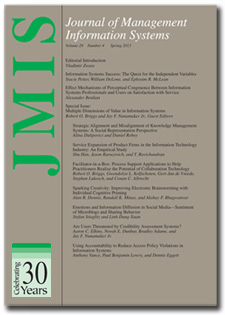信任和推荐质量对采用交互式和非交互式推荐代理的影响:Meta分析
IF 5.9
2区 管理学
Q1 COMPUTER SCIENCE, INFORMATION SYSTEMS
引用次数: 3
摘要
摘要对推荐代理的研究最初集中在交互式推荐代理上,它依赖于明确的方法,即激发用户提供的输入来了解消费者的需求和偏好。最近,由于大量个人数据的可用性,焦点转向了使用隐式方法而非显式方法来理解用户需求的非交互式RA。本文研究了交互式和非交互式RA类型之间的差异,即它们如何影响RA采用的两个重要前因,即推荐质量和信任对用户认知和情感态度以及行为意图的影响。为此,我们开发了一组假设,并使用元分析结构方程建模方法对其进行了实证检验。我们的研究结果有力地支持了互动对RA用户态度和认知的影响。虽然我们发现推荐质量对消费者对交互式RA的认知态度有很大影响,但在非交互式RA的背景下,这种影响在统计学上并不显著,因为推荐质量主要驱动消费者对代理人的情感态度。此外,虽然我们发现认知态度比情感态度对消费者采用非交互式RA的影响更大,但我们的研究结果表明,交互式RA的情况正好相反。鉴于非交互式RA工具最近越来越受欢迎,我们的研究结果对研究人员和从业者具有重要意义。具体而言,本研究通过更好地理解交互式和非交互式RA之间的差异,为消费者使用RA的广泛文献做出了贡献。对于从业者来说,研究结果为RA的设计者和提供商开发和改进更有可能被消费者采用的RA提供了指导。本文章由计算机程序翻译,如有差异,请以英文原文为准。
The Impact of Trust and Recommendation Quality on Adopting Interactive and Non-Interactive Recommendation Agents: A Meta-Analysis
ABSTRACT Research on recommendation agents (RAs) originally focused on interactive RAs, which rely on explicit methods, i.e., eliciting user-provided inputs to learn about consumers’ needs and preferences. Recently, due to the availability of large amounts of data about individuals, the focus shifted toward non-interactive RAs that use implicit methods rather than explicit ones to understand users’ needs. This paper examined the differences between interactive and non-interactive RA types in terms of how they influence the impacts of two important antecedents of RA adoption, namely recommendation quality and trust on users’ cognitive and affective attitudes and behavioral intention. To that end, we developed a set of hypotheses and tested them empirically using a meta-analytic structural equation modeling approach. Our findings provide strong support for the influence of interactivity on RA users’ attitudes and cognitions. While we found that recommendation quality exerts a strong influence on consumers’ cognitive attitudes toward interactive RAs, this influence is statistically non-significant in the context of non-interactive RAs, in which recommendation quality mainly drives consumers’ affective attitudes toward the agent. Furthermore, while we found that cognitive attitudes exert a stronger influence than affective ones on consumers’ adoption of non-interactive RAs, our results indicate that the reverse is true with interactive RAs. Given the recent rise in the popularity of non-interactive RA tools, our results carry important implications for researchers and practitioners. Specifically, this study contributes to the extensive literature on consumers’ use of RAs by providing a better understanding of the differences between interactive and non-interactive RAs. For practitioners, the findings provide guidance for designers and providers of RAs on developing and improving RAs that are more likely to be adopted by consumers.
求助全文
通过发布文献求助,成功后即可免费获取论文全文。
去求助
来源期刊

Journal of Management Information Systems
工程技术-计算机:信息系统
CiteScore
10.20
自引率
13.00%
发文量
34
审稿时长
6 months
期刊介绍:
Journal of Management Information Systems is a widely recognized forum for the presentation of research that advances the practice and understanding of organizational information systems. It serves those investigating new modes of information delivery and the changing landscape of information policy making, as well as practitioners and executives managing the information resource.
 求助内容:
求助内容: 应助结果提醒方式:
应助结果提醒方式:


